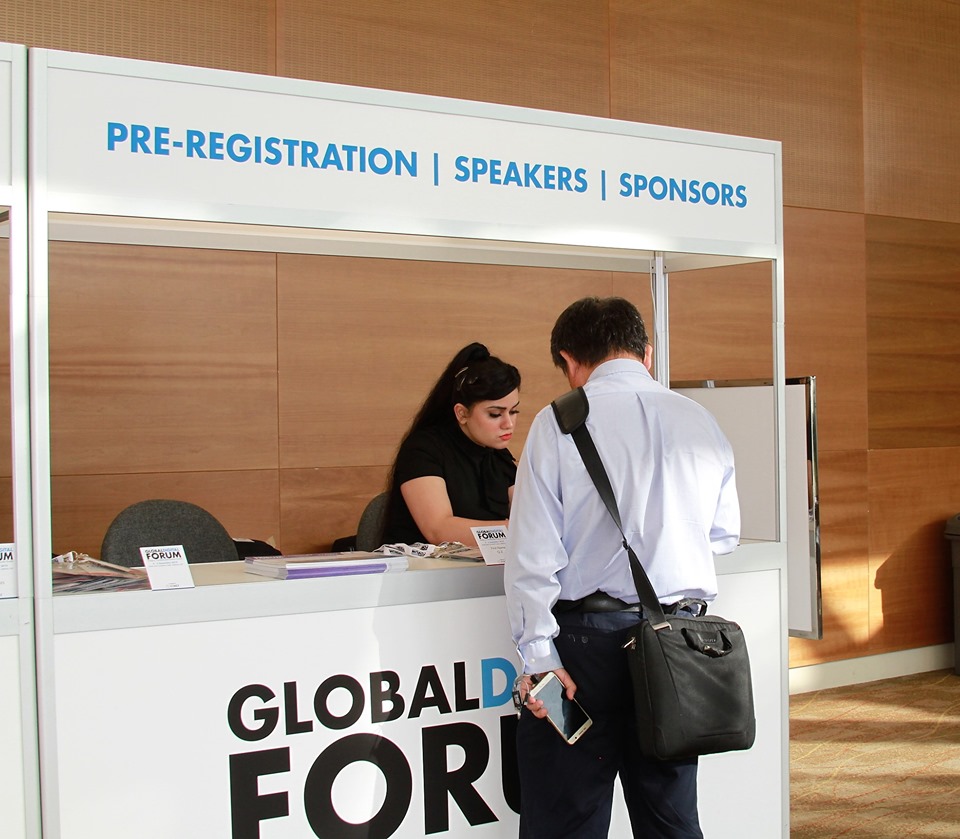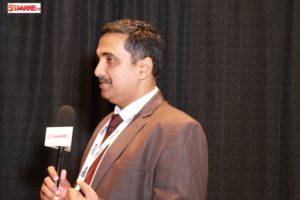
LAKSHMI IYER
India Post News Service
SANTA CLARA, California: A unique conference, Global Digital Forum, was held at the Santa Clara Convention Center September 4-5.
Bringing together experts from the fields of IoT (Internet of Things), Blockchain, AI/ML (Artificial Intelligence/Machine Learning), cybers ecurity and Cloud, the conference was a unique blend of the latest technological concepts and their practical applications. Iconex, a company that has experience hosting conferences in various sectors including the oil and gas industry, in India and the Middle East, was the force behind this event.
Prith Banerjee, Chief Technology Officer (CTO) of Ansys, was the convener of this event.
When asked about the challenges and rewards in organizing an event such as this, Banerjee said: “Over my career, I have attended many, many conferences. Around the world, I have given keynote talks at many IoT conferences, AI conferences and so on. The vision was to bring together people from four different horizontal technologies – IoT, AI/ML, Cloud and cyber security – but applying these technologies to eight verticals such as healthcare, financial services and so on. And the idea was not to talk about technology for the sake of technology but how the technology is applied to different markets.
This kind of a conference has not been done before. It was a really challenging thing, very exciting. We worked on this for more than two years. So this is a culmination of the collective work of a lot of people.”
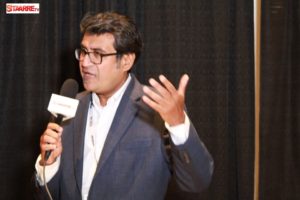
Banerjee further said that the event had an outstanding set of speakers and the response from the attendees was that this was the highest quality. He added that he was looking forward to more such conferences in the future.
Edy Liongosari, managing director and chief scientist at Accenture, who was one of the keynote speakers, talked about the impact of Artificial Intelligence (AI) on Supply Chain Management on the first day.
In his talk, he said that about 70 million jobs would be lost as a result of AI but 130 million new jobs would be added.
When asked about how his company was up-skilling workers for the future, Liongosari said: “One of the things we do is actually work with many of our clients to figure out what are the spaces that will be automated and take care of their employees as well as part of the retraining program. So it is not about job loss but uplift overall. The quality of the work cycle will be better because they no longer do a lot of clerical work but more about getting more intellectually challenging work that will help make more marketable as well. So it is a win-win situation across the board.”
He added that Accenture was getting an upstart in the area by taking over some of the work and re-planning to see how they can train their employees for the future
Arun Bhattacharya from Adobe spoke on AI and Autonomy.
Elaborating on the impact AI would have on the daily lives of people, he cited the example of autonomous vehicles, Bhattacharya said: “Like we see now, you know… Waymo is a part of Google and you see these self-driving cars roaming around all the while in Mountain View and Palo Alto and so on and so forth.
So there was a good discussion on how some of the data that was created, the trillions and trillions of data that is created from these cars and the sensors, on the amount of intelligence that is built into these cars into driving some sort of autonomous vehicles, which is a direct extension of AI that brings in context into the notion of regular driving.”
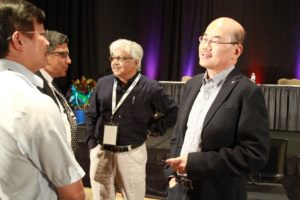
Bhattacharya added that this could bring in benefits such as safety, depending on how much data is collected. “Because as we all know, human beings… when we get tired and things like that, we are all prone to errors.”
He also mentioned discussions on using robots in autonomous vehicles and applying AI in contextual tasks that robots can perform hand-in-hand with human beings for better outcomes.
Daniel Blackburn, a data scientist with a company called Globant in Seattle, Washington, and one of the panelists in a session, explained his field when this correspondent asked him about a day in the life of a data scientist.
“Data science is a very new field. If you work in a grocery store, you know you go to work and do a thing. With data science, you have to manage yourself to figure out what it is that you can do to provide value to your organization,” Blackburn said.
“Data, typically, is a messy thing that comes in through a bunch of automated processes in the organization, and it comes in to make a big pile of data that is a mess. So, our job first and foremost is that of a data custodian. We get everything nice and tidy so you are not dealing with garbage. But also, that data by itself is not valuable. You have to extract insights, as we say, make sense of it…”
He gave an example of the topic he talked about – agriculture. Using the data of farm sensors while planting seeds and collecting crops, one can get an idea of how to grow crops the next year.
“The big picture is giving people – human beings – the next action that they should take to provide value to themselves, if they are self-employed, or to their organization, so that they can improve their lives or the lives of people around them.”
Abhimanyu Singh, director and CEO of Iconex , the company that organized the conference, said, “When we were exploring this, how to organize an event here, and we were looking out for topics, we realized that there is not even a single platform where buyers and sellers can interact with each other. There are so many innovations happening without realizing whether those innovations are commercially viable or not.”
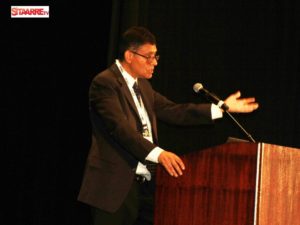
Singh pointed to the tagline of Global Digital Forum – “Making business sense of innovation”.
He cited the example of a case study in management school. A guy had invented a file folder that was so resilient that even if it were dropped from the third floor and a car were to run over it, the papers in it would be safe. He actually showed this. However, the cost of this folder was $30 as opposed to $1 for a regular file folder. Singh said, “It was such a good invention. But everyone thought who is going to throw the file cover from the 10th floor?”
He added, “If you go around the rooms here and you hear what kind of innovations are coming, and the way people are asking questions, they are so relevant here.”
He also said that there were very good interactions in the halls, much beyond expectations.
Another member of the panel on AI, Khanderrao Kand, a senior executive from Amazon, when asked about what advice he would give to graduating students today, said: “If you are looking for the technologies for the next decade, AI is one, IoT is another, Blockchain is another, we are also (in) very fortunate times that a lot of open sources are available, lot of information is available on the net, lot of tools are available, so use them, experiment and implement some of the ideas, take risk, that’s what I would say.”
Pictures and Videos: Courtesy Sitaarre TV, special thanks to Ms. Poonam Bajaj, CEO of Sitaarre TV, with whom this correspondent conducted interviews for her TV channel.

